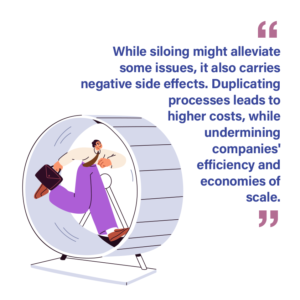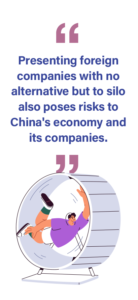
One world, two systems
The diversification of supply chains has been a key trend of recent years, as events such as the Covid-19 pandemic and the war in Ukraine exposed the fragility of global sourcing, production and distribution networks. Companies operating in China have been looking to build resilience through a combination of onshoring parts of their supply chains while offshoring others.
Onshoring and localising functions or entire operations in any market is an organic process that follows commercial considerations, such as increasing efficiency by moving production closer to customers. However, a step further from this trend lies siloing, whereby certain functions or a company’s entire operations in a certain market get cut off from the rest of the world.
Siloing is a rational response to market changes in order to mitigate risks and meet regulatory requirements at both the local and global level. In the China context, the siloing of operations is intended to ensure that a company is fully compliant with Chinese regulations, while being recognised as a trusted, local supplier so that it can continue to work with Chinese partners and qualify for procurement.
Some European Chamber members have invested considerably in this process so that they now resemble Chinese companies in all but name: they have localised their supply chains, workforce, sales and procurement functions, and have siloed their research and development (R&D), data and information technology (IT) systems.
To identify the key drivers behind the trends of siloing and diversification in the areas of supply chains, human resources, data and IT systems, and R&D, and determine how best to shape related advocacy, the European Chamber conducted an online survey and follow-up interviews with its members between August and November 2024.
Summary of key findings
While siloing might alleviate some issues, it also carries negative side effects. Duplicating processes leads to higher costs, while undermining companies’ efficiency and economies of scale. Compliance risks are likely to increase, as the siloed subsidiary’s ability to assess its own role in global compliance is undermined by local functions being cut off from global operations.

It also poses the risk of weakening companies’ global competitiveness. As Chinese regulations leave a relatively broad space for interpretation in practice for what exactly qualifies as being ‘domestically manufactured’, foreign companies are driven towards becoming more risk averse to maintain their status as a ‘reliable partner’ in the eyes of their local customers and policymakers. However, as they are increasingly facing the need to replace key components to fulfill a role in China’s supply chain, they are in turn making their products easier to replace. Moreover, even if a company has siloed its China operations, it may still not be recognised as a ‘domestic manufacturer’ and allowed access to China’s procurement market.
- Siloing of HR
The degree of staff localisation in China is already extremely high and staff movement in and out of the country has become limited. These trends contribute to an erosion of trust between China subsidiaries and company headquarters (HQs).
At the same time, the local talent pool is becoming shallower for foreign companies: top graduates in China now favour job opportunities at government agencies or state-owned enterprises (SOEs). This makes bridging the gap between HQs and Chinese regulators more challenging.
- Siloing of data and IT
Companies that silo their data management and IT systems in China do so to ensure compliance with China’s data regulations and national security laws. This comes at a high cost, and contributes to the growing disconnect between company HQs and their China operations. Furthermore, separating data pools undermines efficiency and creates barriers to companies’ global innovation efforts. Establishing separate IT systems for different markets renders global systems obsolete, which puts foreign companies at a significant disadvantage to their Chinese competitors whose systems can operate globally.
- Siloing of R&D and standards
Companies that silo their R&D in China are typically firms offering products/services that are deemed sensitive. However, siloing R&D leads to duplicate work, while increasing costs and decreasing efficiency. It jeopardises innovation, as the focus shifts from improving existing products or developing new solutions, to supplementing already working components. It also risks undermining a product’s competitive edge, as in some cases the components that firms are pushed to replace are ones that they have developed specifically to add value. In addition, it is harmful even to those companies that derive benefit from China’s R&D ecosystem, because their global operations miss out on China-driven innovation.
One of the ways that foreign companies could better counter the push for siloing is by increasing their influence in standard-setting activities in China. However, while surveyed European companies have observed a general improvement in terms of their access to certain standardisation activities in China in recent years, this has not increased the impact they have been able to have on the development of the country’s domestic standards, which are still heavily influenced by its industrial policies.
Having little or no say in the development of China’s domestic standards poses an additional risk to foreign companies’ global competitiveness if these standards go on to be adopted internationally.

Conclusion
While the perils that siloing poses to companies that resort to this solution are more imminent, there is also a long-term risk that siloing accelerates deglobalisation. This could lead to a reversal of global economic and productivity growth.
Presenting foreign companies with no alternative but to silo also poses risks to China’s economy and its companies. Although some European companies are onshoring supply chains into China to increase resilience, a similar number are moving their supply chains out for the same reason. The outflow of investment to other markets, which is already taking place, is likely to accelerate, leading to a significant loss of jobs and tax revenues for China. Some markets have already begun looking into tools that can better protect their own companies against Chinese competition on their own turf, a trend that is likely to pick up pace if there is no change in the current policies that compel foreign companies in China to silo.
Mariann Nagy is a policy and communications manager at the European Chamber and was the lead writer of Siloing and diversification: One world, two systems. The full report can be downloaded here: https://www.europeanchamber.com.cn/en/publications-siloing-diversification


Recent Comments